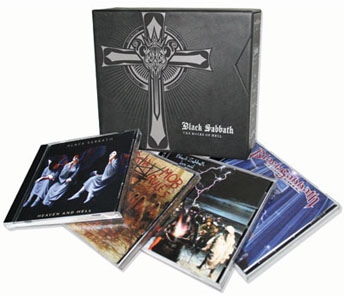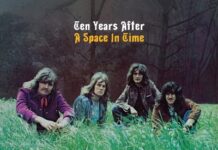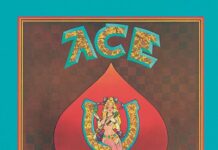By the end of the 70s, it appeared as though the creative well from which Black
Sabbath drew their brooding firepower had exhausted itself dry. Ozzy Osbourne
was booted from the band for some hazy form of insubordination, and it was speculated
that the once and mighty Black Sabbath was about to become a relic of the past.
But alas, guitarist Tony Iommi, bassist Geezer Butler and drummer Bill Ward
were all for carrying on with the Sabbath name using a different singer. They
hired Ronnie James Dio, fresh from Ritchie Blackmore’s Rainbow, and proceeded
to reinvent the wheels of confusion. Over 25 years later, The Rules
Of Hell, a five-CD box set from Rhino, documents the historical reign
of Black Sabbath Mach II.
Now that Iommi, Butler, Dio and drummer Vinny Appice (who replaced Ward in
1981) have reassembled under the name Heaven And Hell, what better time than
to get reacquainted with the three studio albums and the double Live
Evil — all shined up, remastered and bundled together. If you
were around in 1980, you might remember how Heaven And Hell,
the first Dio-Sabbath album, raised the stakes in the competitive quagmire of
heavy metal. The inimitable riffs, pushed forward by a pulsating, brawny bottom
end, were just as authoritative and unrelenting in their attack as they were
in the 70s. The music was much more refined as Dio introduced a more mystical,
melodic confidence to the proceedings, offering a familiar, but altogether different
ring of satisfaction. It was still all dismal and doomy, but when you added
in a few castles and dragons, you understood Ozzy was no longer a part of the
equation.
So onward with eight killer tracks from Heaven And Hell that
kept longtime followers fat and happy, and converted a legion of Dio-era Sabbathites
along the way. “Neon Knights” remains the quintessential metal mirage,
possibly one of the greatest licks Iommi has ever conjured. The title track
and “Die Young” tag along for kicks, while “Children Of The
Sea” is a comfortable fit that is in no way reminiscent of “Children
Of The Grave.” From the ground to the ocean, Sabbath managed to lift the
veil with a different flavor, all while remaining true to their dark and shadowy
image. Considering the changing tide of the 80s, the climate couldn’t
have been better for a newly polished Sabbath and a crazy-train-bound Ozzy Osbourne.
Before that battle was settled, Dio, Iommi and Butler went back into the studio
for their sophomore follow-up. Always the closest to Osbourne, Ward left the
group, and Vinny Appice, brother of Carmine and a hard hitter in his own right,
was invited to man the drum throne for Mob Rules. The riffs
are still wet and chunky on “Turn Up The Night,” “The Sign
Of The Southern Cross” and “The Mob Rules.” The coalescing
chemistry brewing in the band was firmly entrenched — and it looked like
this new Sabbath model was ready for the long haul. But then the inevitable
clash of egos and ideas started working their way into the foundation. It took
a live album to completely derail the train.
It’s inconceivable Warner Brothers never released a proper Black Sabbath
live album in the 70s (1980’s Live At Last, released
as an import, was an ill-conceived tease; the 2002 upgrade, re-titled Past
Lives, was a vast improvement with better sound and additional tunes,
but all for naught). 1982’s Live Evil was supposed to
rectify the live album issue. Unfortunately, Iommi and Butler drew a line in
the sand and were wrestling for control. Dio had ideas of his own, and Live
Evil went through a series of transformations. By the time of its release,
Dio and Appice had already departed to start their own band. This reviewer recalls
the bad mix on the original vinyl version, so the remastered CD is welcomed.
The performances are strong, especially on the “Heaven And Hell”/”Sign
Of The Southern Cross” suite, but there is a downside. Hearing Dio sing
“War Pigs,” “Iron Man,” “Paranoid” and the
aforementioned “Children Of The Grave” can be a bit unsettling for
Ozzy fans. Apparently, it was enough to keep Dio from performing those songs
ever again.
Ten years later, Dio, Iommi, Butler and Appice reconvened for another round
and recorded Dehumanizer. Much is made in the extensive liner
notes (which accompanies each CD) about how “underrated” this album
is. Most of the blame is shifted over to grunge, which was salaciously devouring
heavy metal at a rate of 25 metalheads a day. Lots of blame can be attributed
to the record’s dire performance. Why the group chose Reinhold Mack (aka
Mack) to produce it, remains a mystery. Mack, who worked on a few records with
Queen in the early 80s, may be at the root of the problem with Dehumanizer
from a technical standpoint. Aesthetically, songs like “Computer God”
and “TV Crimes” have all the makings of classic Sabbath riffs (although
“Letters From Earth” has more of an Iommi feel than anything else
on the record). The Wayne’s World version of “Time Machine”
probably sounds better than the rest of the album because it was produced by
the band. Overall, however, the record lacks a true sense of conviction. They
can blame grunge, grudges, old age and technology all they want; but without
the necessary elements of heart and soul, Dehumanizer never
had a chance. Still, as the fifth and final disc that blew the casket on my
5-CD carousel, it’s easy to detect that this was an album that left the door
open for some unfinished business.
And in walks Heaven And Hell, a kissin’ cousin of Black Sabbath’s.
The two camps co-existence more as luxury vehicles for the players than places
to hang their hats. Ozzy Osbourne surpassed his role as the original Black Sabbath
singer decades ago. And Ronnie James Dio is a true survivor of the fittest,
seemingly never without an outlet. So why shouldn’t Iommi and Butler enjoy
the best of both worlds when time and circumstance (instead of ego and anger)
serves the outcome? It can work when you live by The Rules Of Hell.
~ Shawn Perry




















